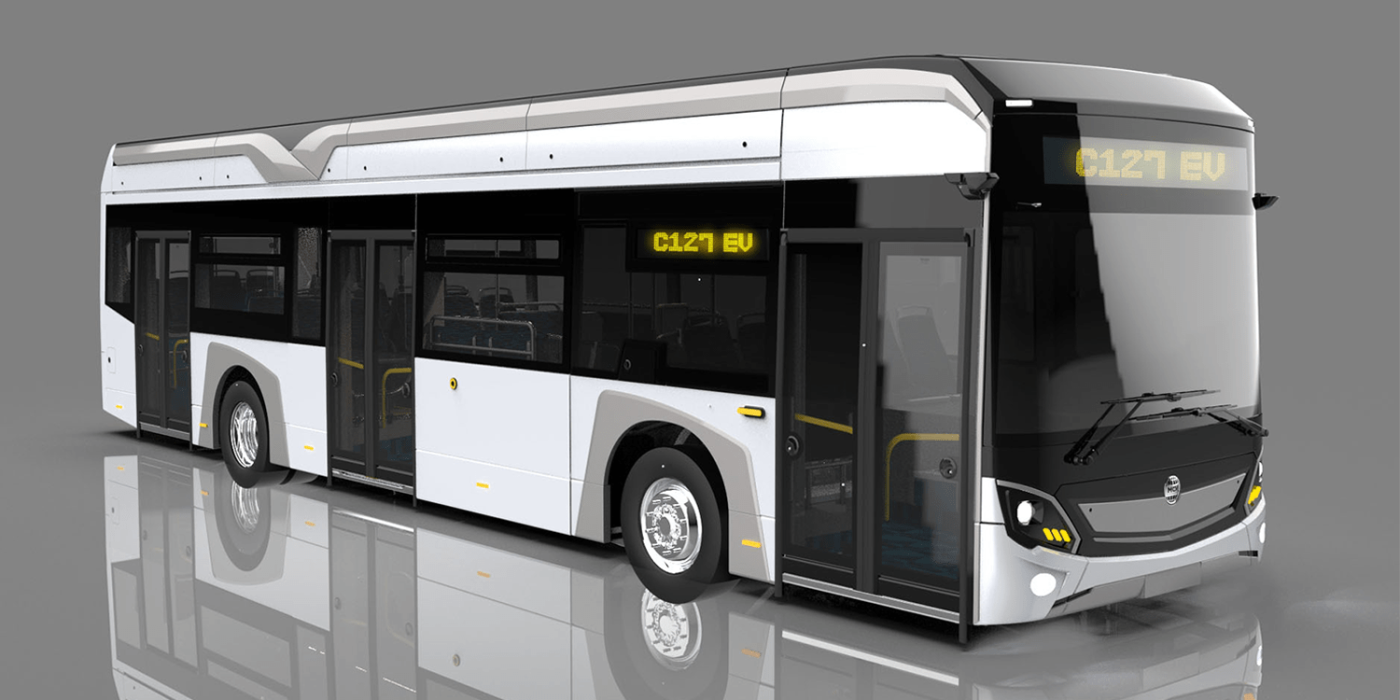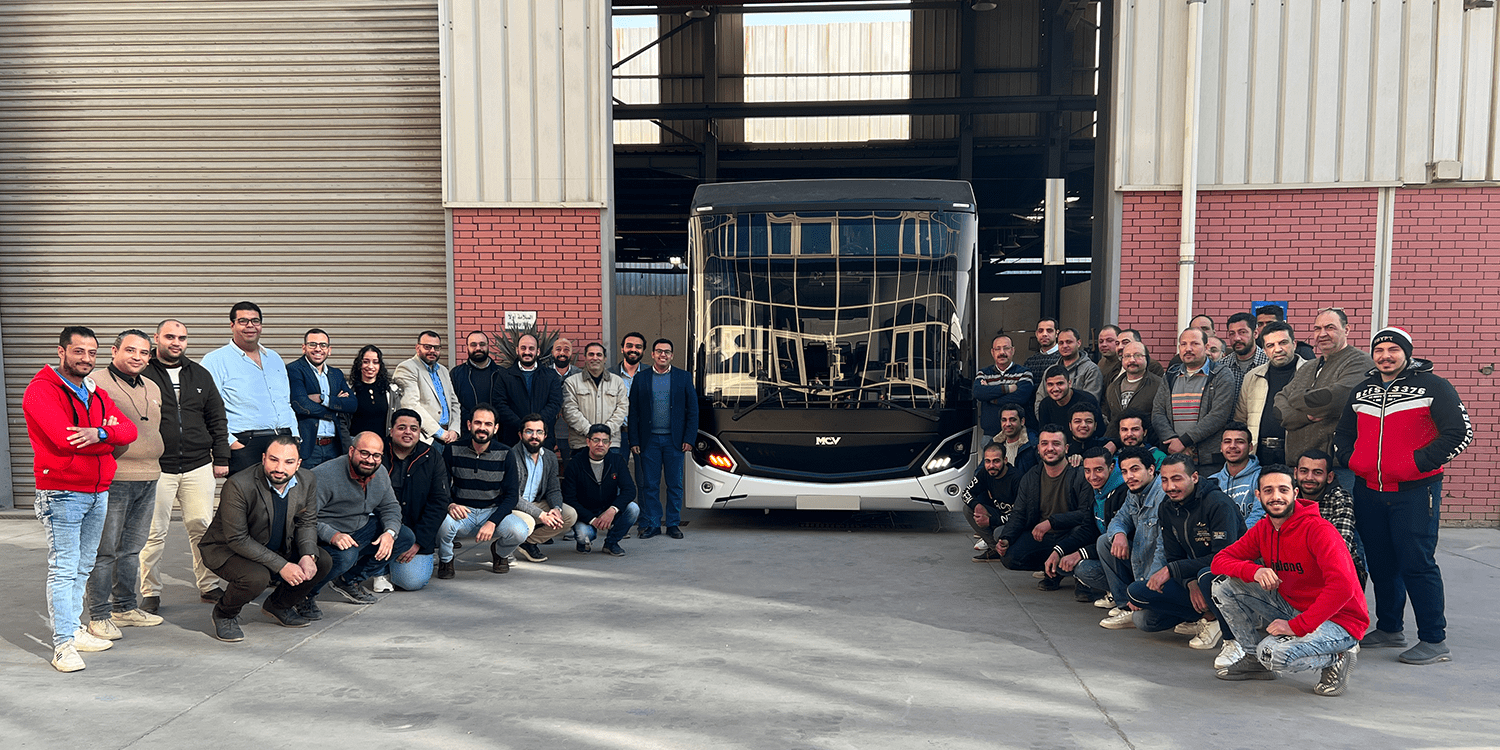Egypt’s MCV launches electric bus for German market
The Egyptian manufacturer, Manufacturing Commercial Vehicles (MCV), is entering a continental European market. The OEM has developed a bus specifically for clients in Germany and has already founded a subsidiary, MCV Deutschland GmbH, for sales, after-sales and services.
***
The official presentation of the integral, fully electric twelve-metre low-floor bus will take place in March at the company’s “Germany centre” in Meschede, North Rhine-Westphalia. Still, the company has revealed the first details in advance.
The company’s European subsidiary, MCV Deutschland GmbH, was founded last year with headquarters in Bestwig/Meschede. The Egyptian manufacturer’s German subsidiary is to focus on the sale and maintenance of zero-emission city and intercity buses. These electric buses will be offered in versions with purely battery-electric and hydrogen fuel cell systems. MCV also has international subsidiaries in Great Britain, the United Arab Emirates, South Africa and Singapore.
The model for the German market is called C127 EV and is not just a chassis body. For the UK market, MCV uses the BEV base from Volvo Bus. According to the marketing manager at MCV Deutschland GmbH, Jochen Grau, the electric bus has been redeveloped for the German market as a completely independent product.
In the run-up to the debut, Grau has revealed several insights into the model’s technical data sheet. Battery packs with a capacity of 308 kWh, 385 kWh or 462 kWh can be installed on the roof of the new electric bus. MCV is installing liquid-cooled batteries from Forsee Power called ZEN Plus LiNMC battery type, with which “up to 5,000 charging cycles should be possible”.
MCV promises high VDV guideline conformity
According to Grau, the battery can be charged via a CCS2 plug (150 kW) or up to 450 kW via the power rail. The so-called “active balancing” of the batteries and installing a CO2 heat pump are state-of-the-art, so the company.
For the drive, MCV relies on a central electric motor from Actia with a peak power of 250 kW and a maximum torque of 3,000 Nm. “From the beginning, we kept the German market and its needs in mind during development,” Grau emphasises. Accordingly, the C127 EV conforms to VDV guidelines. (VDV is the Association of German Transport Companies with about 600 members). As for the new MCV vehicle, the Ventura doors, ZF axles, the VDV dashboard, and the mirror replacement system from Orlaco have a classic look. Cantilever seating and a flexible interior concept are in line with the competition.
In terms of dimensions, the MCV electric bus measures 12.07 metres in length, 3.2 metres in height and 2.55 metres in width. The wheelbase is 5.9 metres. With a maximum axle load of 11.5 tonnes, the two-door vehicle, for example, can carry 85 passengers – 37 seated and 45 standing. In the case of the three-door model, the increased number of standing places makes it possible to carry 90 passengers.
Well-thought-out details are supposed to set the product apart from the competition. Still, MCV does not want to revolutionise the electric bus market – e.g. with lightweight construction or in-floor batteries. The German MCV subsidiary has announced a hydrogen fuel cell version in addition to the battery-electric bus. For this reason, there will be an H2 filling station on the service grounds of the German subsidiary, for which the company says the planning has already been completed. The new location in Meschede, not far from Germany’s old industrial heartland in the so-called Ruhrpott, shall be geared to the needs of alternatively powered commercial vehicles and will be completed shortly.
Rooted in Daimler
MCV is active worldwide. With plants in Egypt, Singapore and South Africa, the manufacturer represents a global player in the bus market. At the same time, MCV buses already have a German element since they are based on Mercedes-Benz chassis. And these sell well. The company secret is that MCV was founded in 1994 as a general agency of Daimler and has continuously adapted to market needs ever since. Experience from the CKD assembly of buses was helpful. In 2006, production began under the company’s brand name.
MCV manufactures about 10,000 buses and 1,500 trucks annually in Egypt. The portfolio includes city buses, intercity buses, coaches and trucks for various applications. MCV employs approximately 6,000 people worldwide and has an international presence in more than 50 different countries around the globe. MCV says it exports about 60 per cent of its annual production.
Report by Rüdiger Schreiber, Germany.






0 Comments